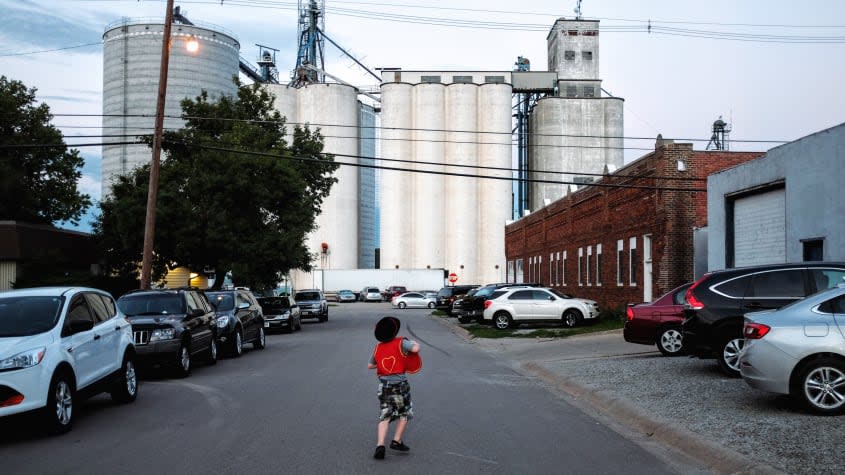Should child labor laws be loosened?

- Oops!Something went wrong.Please try again later.
Should America's kids be sent to work? NBC News reports that Sens. Alex Padilla (D-Calif.) and John Hickenlooper (D-Colo.) have sent letters to the CEOs of 27 companies asking about their compliance with the nation's child labor laws — a query that comes after federal reports of a 69 percent increase in the number of kids found working in violation of those rules. The letters went to high-profile companies including General Mills, J. Crew, and Target.
But the inquiry comes as state-level lawmakers across the country "are invoking a widespread labor shortage to push bills that would weaken long-standing child labor laws," Axios reports. Arkansas Gov. Sarah Huckabee Sanders (R) in March signed a bill loosening her state's barriers to child labor, allowing teens as young as 14 to work without obtaining special permits. "The governor believes protecting kids is most important, but this permit was an arbitrary burden on parents to get permission from the government for their child to get a job," said a spokesperson for Sanders.
That effort has generated a pushback of its own, The Guardian reports. "It's just crazy to me that we are re-litigating a lot of things that seem to have been settled 100, 120 or 140 years ago," says Charlie Wishman, president of the Iowa AFL-CIO, adding: "Child labor law is there to make sure that kids are working in age-appropriate work activities or occupations that are appropriate for their age."
What are commentators saying?
It's easy to see why employers like young workers, Jessica Martinez and Marcy Goldstein-Gelb write at The Progressive. "With less information, less power, and fewer options, they are easier to exploit." There are good reasons to keep kids out of the workplace: They're more prone to injury, and they usually end up falling behind in their education as well. That means it is urgent "to enforce the child labor laws that already exist and push back forcefully against any attempts to weaken them."
"Most successful adults began working as teenagers," the Washington Examiner editorializes. Those youngsters learned valuable life lessons about how to "work, earn, and be responsible for making their own way in life." Today's teenagers, meanwhile, spend too much time on social media while doing "too little growing up." Working lets them share in their responsibility to pay for college, and can even let them get a head start on saving for retirement. But ultimately, the question is one of parents' rights: "If parents believe their 14-year-old is ready to work a part-time job, the government has no business intervening."
But the debate isn't really about teens, Helaine Olen writes at The Washington Post. "It is part of an ongoing campaign to roll back worker protections. While child labor advocates are "draping their appeals in the language of parental rights" that's actually disingenuous: The real goal is to reduce wages for employers under the guise of expanding opportunities. The result hurts young people. "We should — if anything — be putting tighter curbs on employing high school students."
What's next?
Iowa may be the next battleground. Legislators there are considering a bill that would let teens participate in "work-based learning programs" that let them "work hazardous jobs, such as in meat packing factories and mines," Siouxland News reports. The bill would also expand the hours teens can work — from 7 p.m. to 9 p.m. — and allow 16- and 17-year-olds to serve alcohol with a parent's permission. The Des Moines Register reports the effort has the support of 50 percent of Iowans.
If states do relax their child labor laws there are some safeguards still in place. "States will still have to comply with federal regulations, which sets standards for the types of jobs minors can work," Axios points out. But critics are skeptical. "Relying on the federal system to protect children from exploitative work is a dubious proposition," Ellen Ioanes writes at Vox. Recent reports of child labor law violations suggest "the federal system has failed the most vulnerable children."
Using child labor may not always be a winning proposition for big companies. NBC News reports that PSSI, a slaughterhouse cleaning company that was found illegally employing 100 children in dangerous jobs, recently hired a new CEO and launched a $10 million fund to fight … child labor. The company says it did not knowingly hire the kids, but says: "Regardless of the reason [the violations] occurred, however, it is our responsibility to fix the problem."
You may also like
5 unlawfully funny cartoons about justice
Should Trump's judge muzzle him?
Jeremy Renner recounts snow plow accident, says he 'could see my eye with my other eye'

